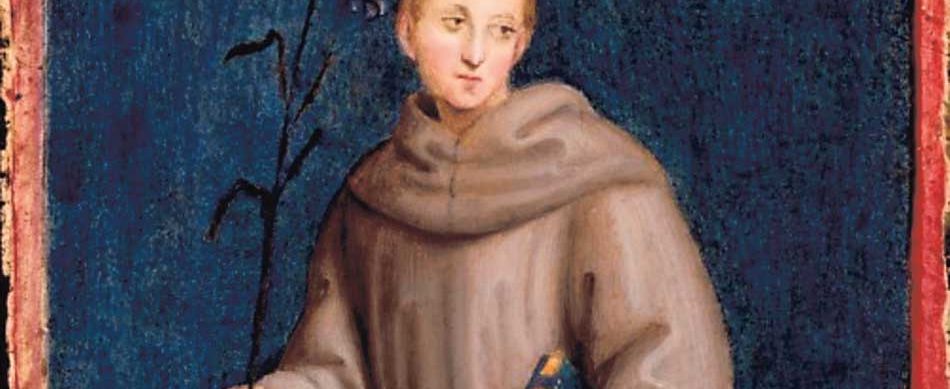The 7-Prayer-Day
SINCE every religious Order is built on faith, communication with God (prayer) must be the Order’s foundation. Thus, the Rule of 1221 made prayer its bedrock. Section 12 states: “All are daily to say the seven canonical Hours.” Today, this would be the Office of Readings, Morning Prayer, Mid-morning Prayer, Mid-day Prayer, Mid-afternoon Prayer, Evening Prayer, and Night Prayer. Those who knew the Creed and Psalm 51, commonly called “The Penitential,” prayed them daily upon rising and upon retiring. Those who knew the Psalter also daily prayed Psalm 54 and Psalm 119 up to verse 33, with the Glory Be following each Psalm. Illiterate penitents prayed a certain number of Our Fathers and Glory Bes (Section 12). The sick were exempt (Section 13).
At penitential seasons before Christmas and Easter, all penitents attended Matins (Section 14). Monthly they met in church and assisted, as a group, at ‘Divine Services’ (Section 19).
Daily life
This intense prayer life spilled into daily life. Penitents confessed their sins three times a year (Section 15), which was exemplary, since many people waited until their deathbed. They received the Eucharist at Christmas, Easter, and Pentecost (Section 15). Avoiding unnecessary oaths (Section 17) assisted in honoring God and avoiding conflict. In the evening, “when he is obliged to think over what he has done,” the penitent prayed three Our Fathers if he had sworn inadvertently (Section 18).
Some current Third Order groups follow the original Rule and retain its prayer stipulations. They have updated the requirements by asking that members attend daily Mass, confess twice monthly, and receive the Eucharist daily when in the state of grace. The largest Third Order group, the Secular Franciscan Order, exhorts its members to “join in liturgical prayer in one of the forms proposed by the Church” (OFS Rule, Section 8). This includes the Mass and the Divine Office. Details are left up to the member and to their local group, the fraternity. Most fraternities expect their members to pray Morning, Evening, and Night Prayer from the Divine Office.
Impatience
Saint Anthony wrote his Sermon Notes for friars who were preaching to the populace, including lay penitents. He addressed sections of his sermons to the penitents. Anthony had a realistic sense of the penitential life. He knew that, once we recognize our sinfulness, we can grow impatient because we are not seeing quickly enough the fruits of our prayer. He likely heard many penitents confess that they prayed their Rule’s prayers faithfully, yet felt little spiritual progress.
For their instruction, Anthony used Jesus’ parable: “Suppose one of you has a friend to whom he goes at midnight and says, ‘Friend, lend me three loaves of bread, for a friend of mine has arrived at my house from a journey and I have nothing to offer him,’ and he says in reply from within, ‘Do not bother me; the door has already been locked and my children and I are already in bed. I cannot get up to give you anything.’ I tell you, if he does not get up to give him the loaves because of their friendship, he will get up to give him whatever he needs because of his persistence” (Luke 11: 5-8).
Anthony identifies as Jesus Christ the “friend” from whom the needy man begs bread. The “friend who has come from a journey is the mind which departs from us as often as it wanders off to look for temporal things. It returns when it thinks of higher things and desires to be refreshed with heavenly food” (Sermons for Sundays and Festivals IV, p. 235; translated by Paul Spilsbury; Edizioni Messaggero Padova).
Inner dryness
Thinking it had better return to God, the wandering soul begs spiritual nourishment from God, but receives nothing. What has happened? By dwelling on temporal things and neglecting spiritual ones, “the sinner remains in darkness of conscience, and lacks the rain of compunction.” In other words, the sinner’s conscience has grown lax and no longer feels guilt or moral scruple about being swept along by worldly concerns. The active life becomes “of iron,” and from it he can receive no fruit of consolation, only coldness and hardness of heart… instead of an abundance of tears [of contrition for sin], the wretched soul is given the dust of the most trivial thoughts, which dry it up” (Sermons IV, p. 236).
No nourishment
Have you ever been in this spiritual desert? Because you became entwined in various matters (possibly even church or charitable endeavors), your spiritual life suffered. Busyness has swallowed God. You beg from God basic spiritual nourishment (three loaves of bread). Yet God seems to reject your plea. You reach a turning point. “There is no sweetness in the contemplative life, no comfort in the active life, blindness of mind in prayer, aimless wandering among temporalities” (Sermons IV, p. 236).
Should the penitent, therefore, cease praying? Jesus told this parable to praise the persistence of prayer. God has not answered “either because of our sins or to make us more fervent to pray and beseech.” Increased prayer increases recognition of sin. Increased prayer whets the desire for what is refused. God honors persistence. “For unremitting effort conquers all, and by the inspiration of his grace he will give him [the penitent] all he needs, even if it is not all he sometimes wants” (Sermons IV, pp. 236-7).



